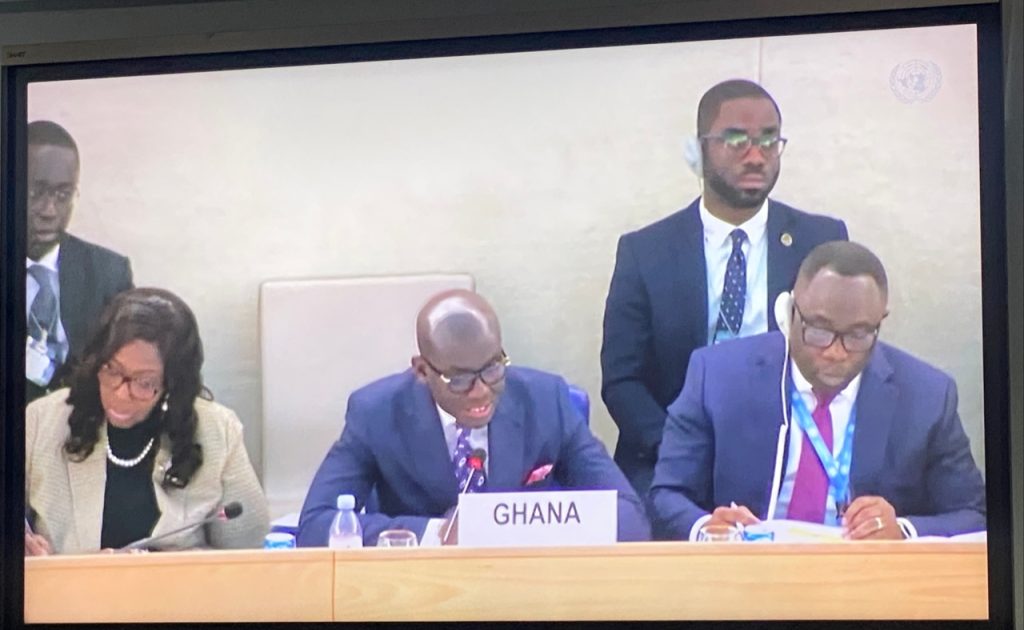Accra, Jan 26, GNA – Mr Godfred Yeboah Dame, the Attorney-General and Minister of Justice, says Ghana is considering the passage of a Sentencing Act as a mechanism to further reduce congestion in prisons.
He said a draft community sentencing bill would soon be laid before Parliament for approval after stakeholder consultations.
Mr Dame made these remarks during the watch party session of the United Nations Universal Periodic Review (UN UPR), in collaboration with CDD-Ghana and Perfector of Sentiments (POS) Foundation, convenors of the Ghana Civil Society platform on the UN UPR.
The aim of the watch party session was to monitor
the state of Ghana’s human rights record review at the 42nd session in Geneva, Switzerland.
The UN UPR is a State-driven process, which reviews the human rights records of all 193 UN Member States once every five years, providing an opportunity for States to demonstrate what actions they have taken to improve the human rights situations in their countries under the same rules and supervision.
Mr Dame said issues concerning the conditions for detention detainees and inmates were priorities for the government, and that several measures were instituted to improve the conditions in which detainees were kept.
These include enforcement of COVID-19 safety protocols in all prison establishments and supply of personal protection equipment to inmates.
“Detainees are also equipped with business skills in order to make life more comfortable after release from detention,” he added.
Mr Dame said the establishment of health care and agricultural directorate at the Ghana Prisons Service was to improve inmates’ health and their diets, and the construction of new prisons to reduce overcrowding in existing prisons.

Mr Mark Dodoo, Project Officer and Executive Assistant at POS Foundation, said the UN UPR was a peer review mechanism under the UN, under which every Member States under the UN was reviewed.
He said under the mechanism, various States submitted their reports, which highlighted the state of human rights in their countries, to the UN Human Rights Council, after which various States under the UN converged in Geneva, Switzerland, to review the state of human rights in the various countries.
Mr Dodoo said Ghana was going through its 4th UPR cycle review and that civil societies met under the Ghana UN UPR platform to draft and develop reports to be submitted to the UN Human Rights Council.
He also stated that, “currently, the state has sent a delegation led by Mr Dame to Geneva in Switzerland, to deliver their raw submission on the state of Ghana’s human rights record based on the reports that they have submitted earlier, in the month of October.”
Mr Dodoo said other states which fell under the UN made recommendations to the States and highlighted the various gaps which existed within Ghana’s human rights record.
“Equal protection of every individual in Ghana, recommendations bordering issues of sales of children, prostitution, and also various calls for the abolishment of the death penalty, were some of the recommendations raised,” he said.
Mr Dodoo said based on the recommendations received, there was going to be a workshop, to bring together various MMDAs, civil society organisations, as well as development partners to dialogue on the recommendations, develop an implementation plan and an action strategy.
He said the implementation plan would set out what was needed to be done by the state based on the recommendations submitted, with the action strategy outlining various bodies and the Ministry to be in charge of the implementation of the recommendations.
He said, however, the biggest issue had to do with implementation, such that after every human right UPR, which had existed from the first to the current UPR, there seems to be an ever-existing issue of repetition of recommendations that have been made.
“Now, this is an issue because there is a gap which exists when it comes to the effective implementation of these recommendations, so even though the laws are in existence, the bodies supposed to make them well implemented are lacking resources, manpower, lack of State will and others,” he added.
GNA